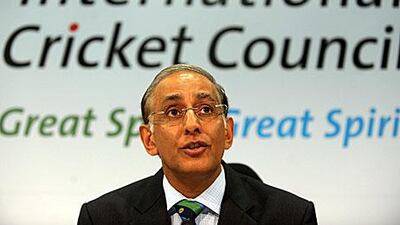In one of his first interviews on taking up the post of the International Cricket Council (ICC) chief executive in April 2008, Haroon Lorgat said the organisation needed to transform to meet the demands of the modern world.
It was the kind of empty line any eager incoming executive might throw around, a bright smile, a fresh suit and firm handshake tossed in as accoutrements.
It is only now, as he prepares to depart four years later having left the game with the Lord Woolf report to deal with, that it emerges he might have been serious.
In his time, much has changed and is changing.
The Indian Premier League (IPL) was still two weeks from bursting into our heads when he was appointed.
That year he would have to postpone the Champions Trophy and move it from Pakistan because of security concerns, an issue that would assume much greater urgency the following March.
Pakistan would continue to be problematic, the spot-fixing kerfuffle one headache, a diabolically dysfunctional administration another migraine.
There was much else, not least the former Australian prime minister John Howard; hitherto only a divisive figure in the real world, his failed vice-presidency nomination would bring similar friction to cricket and reopen old divides within the body of race and culture.
And all the while, each day that came brought with it further proof that the game was not being run as much as squeezed of as much as it could give.
Administration was whatever financially powerful boards wanted it to be, built on bullying and hotel corridor wheeling-dealing.
It is these daily aches, more than the headline issues, that have weighed heavier on Lorgat's mind.
The Lord Woolf governance review, instigated by Lorgat and made public to the nervousness of all cricket boards, is the mirror that nobody has before held up to the game.
The assessment is not shocking and its prescriptions not really radical. But the act of it being said and written is as important as its content.
The report calls for a complete overhaul of the way the game is run because it believes - and this is the most damning conclusion in its 68 pages - that the "ICC reacts as though it is primarily a Members club; its interest in enhancing the global development of the game is secondary".
That is exactly what it is.
Prime among its recommendations is the creation of a stand-alone, independent ICC, until now only a myth in the heads of many.
For every wrong in cricket the ICC is blamed, without the accompanying realisation that the ICC is merely the sum of its member boards' interests and decisions.
It is not some independent body that is in control and at fault.
So the report calls for the creation of an independent tier of directorship from outside the member boards and the game as well, so that the executive board is less dominated by the bigger members and thus, by its own self-interest and more accountable to an even development of the game.
It also believes that ICC directors should not hold posts with member boards as is the case currently, so that there cannot be conflicts of interest between what is good for the game and what is good for one board. Their primary commitment should be to the ICC.
The immediate benefit of such independence would be firmer control over, for example, the Decision Review System (DRS).
It might also bring more stability, uniformity and fairness to the Future Tours Programme (FTP).
There is much else, almost all of it eminently sensible.
It says that full membership - currently accorded only to Test-playing nations - should be opened up to high-performance countries who do not play Tests, to give them more of a stake and a voice in the game.
It calls for a revamp of the ICC's funding models, both in the generation and distribution of revenue.
Here it highlights again a central discord at the heart of the ICC's function: "We believe there is an inherent conflict between the consequences of the ICC's objective to increase the commercial revenues from ICC events to maximise distribution to members and its objectives to develop the global game."
All of it is so sensible that there is almost no chance any of it will be implemented (even though the review details measures to make the transitions smoother).
The full members are expected to discuss the report at the next ICC meeting in April.
But one official, when the report was presented, remembers members wanting the report to be put away in a drawer and forgotten.
Another is sure it will never be implemented.
And how can it? How can full members - these ones in particular- agree to cut their own powers and share of revenue?
In an interview with The National recently, Lorgat expressed hope that there could be implementation pointing to the example of members who have independent directors on their own boards.
But privately, he more than anyone will know it won't happen, having seen self-interest prevail over the Test championship, World Cup participation and DRS.
He has been part of some fierce battles inside the ICC on these very issues; at the recent meeting in Dubai, he was asked by directors to actually leave the room, ostensibly because they wanted to discuss his replacement but also because of a continuing, tetchy relationship with other directors.
The concluding irony in all this is that even if the recommendations - absolutely necessary as they are - are implemented, the ICC is only set on a road map to become like other sporting bodies around the world, say Fifa as one.
And what an aspiration that is.

